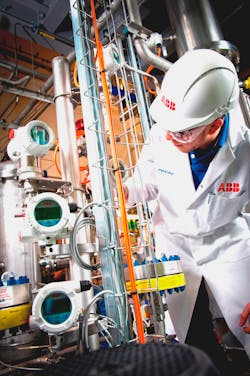ABB and Imperial College London extend partnership to foster net-zero workforce through carbon-capture pilot plant
The good news is global growth in greenhouse-gas (GHG) emissions was not as high as some had originally feared amid the disruptions caused by the global energy crisis, according to “CO2 Emissions in 2022,” which provides a picture of energy-related GHG emissions. Published by the International Energy Agency (IEA) in March 2023, the report brings together the IEA’s latest analysis, combining the agency’s estimates of CO2 emissions from all energy sources and industrial processes, as well as providing information on energy-related methane and nitrous-oxide emissions.
The report is part of the IEA’s support of the first global assessment of the Paris Agreement, which will be finalized in the run up to COP28, the next United Nations Climate Change Conference, at the end of 2023.
If you’re waiting for the bad news, there is none, at least not in this case. Only further good news: A dedicated carbon-capture pilot plant will continue to train the net-zero workforce and engineers and scientists of the future, after ABB and Imperial College London signed a 10-year contract to extend their partnership. More than 4,500 students have had hands-on experience of ABB’s technology at the plant since it opened in 2012 at Imperial College, the technology company reported.
“Extending the partnership with Imperial College allows us to offer students practical training to prepare them for a career in industry,” said Simon Wynne, head of energy industries, ABB UK & Ireland. “A report by EngineeringUK says that for the United Kingdom to meet emissions targets by 2050, there needs to be a workforce, with the right STEM backgrounds, ready to respond to the energy transition challenge.”
The plant, which is spread over four floors, uses ABB Ability System 800xA for distributed process control and more than 250 instruments, measuring temperature, pressure, carbon dioxide and flow. System 800xA is designed to control and coordinate all aspects of the plant process, which is then visualized on displays in the ABB Control Room where students can monitor and intervene if necessary (Figure 2).
“When we started the partnership with ABB, the aim was to encourage more people to go into and stay in chemical engineering,” said Dr. Colin Hale, senior teaching fellow at Imperial College London. “One of the ways to do this was to set up this carbon-capture plant so we could enthuse students to follow through on the environmental topics they have learned previously. ABB shares this collective vision.”
At the carbon-capture pilot plant, Yiheng Shao, a fourth-year undergraduate student, has actively participated in the operation of the process, gaining a deeper understanding of the development and application of the technology. “This experience has also bolstered my confidence in the role of carbon capture in achieving net-zero goals,” said the student.
Carbon capture and storage (CCS) can help decarbonize industry, reduce emissions and reach net zero. "Global Status of CCS," a September 2022 report from the Global CCS Institute says there was a 44% increase in the number of CCS facilities around the world compared with the previous year .
To enable the commercial CCS market to scale, ABB is deploying technology to lower the capital and operational investment costs and de-risk integration into existing and new operations. In March 2023 ABB joined forces with London-based Pace CCS to make the capture, transportation and storage of industrial carbon dioxide emissions more accessible. Key to this is using digital-twin technology to provide a virtual replica of a real process to test scenarios and deliver proof of concept.
Earlier this year, the United Kingdom government outlined its Powering Up Britain policy. This series of net-zero pledges aims to deliver an energy system with cleaner, more affordable energy sources.







